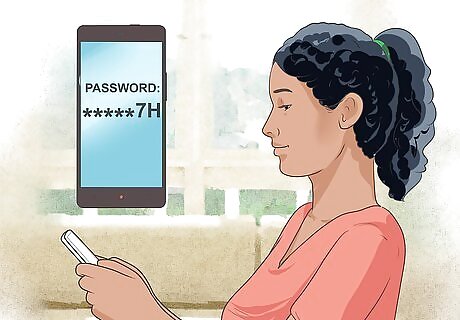
views
X
Research source
[2]
X
Research source
Spying In Person

Please consider an alternative to spying. Never throw around false accusations and never judge your current lover by what people in your past did to you. Only resort to monitoring someone's device usage if these tips fail and your suspicions are not simply based on jealousy, but reasonable suspicion. It is always better to be upfront and simply ask to see your significant other's phone. Same thing applies when wondering who your child is texting. Have a conversation about your trust issues, insecurities, suspicions doubts or concerns before resorting to spying on someone. Always be respectful and mindful of someone else's privacy. Talk to your child about appropriate cell phone use. Do not be afraid to set limits such as when they can use their phone and regularly monitor their web and text behavior. There is nothing wrong with a parent that is trying to be completely aware of his/ her child's phone and internet activities. Set up a time to sit and talk with your significant other without any distractions. Set aside a couple hours for just the two of you. Use that time to discuss any concerns, doubts or fears that you have. You could also try writing them a letter in advance and then arrange a meeting in a neutral location (if that would be easier for you). Do not be judgmental or condescending, and never jump to conclusions or hurl unproven accusations at them. That will simply push the person away. They will not view these issues as simple concerns that you have (that you two can work through). They will instead view your hostility and accusations as proof that you do not trust them, at all. Just express how you feel and what actions led you to feel this way. Maybe they are not cheating, but their texting to another person might make you feel uncomfortable. Surely, if they are indeed not hiding anything, then they'll understand your honest concerns. They would likely be more than willing to let you see what you wish to see. Keep in mind, information can be deleted and people do lie. You should still always attempt to talk with your partner.

Search their phone when they're busy or distracted. This is the most simple means of spying on a person's phone. Wait for a time that they set their phone down due to being in a hurry. If they have to rush to leave a room or run an emergency errand. You must then quickly read text messages and search their call/web history, and if time permits check social media as well. Most times, if someone is doing something dirty behind your back they will delete the messages/ calls that could prove it. If you have a chance to get the device when they are busy, distracted, or caught off guard then they may have not had a chance to wipe away evidence, yet. So act quickly, and be smart. If you find anything, screenshot the evidence, send it to yourself, then store it in a private protected folder or print it out, to be kept safely in a lock box. Always make sure to delete the screenshots and messages that you send to yourself.
Passwords and Locks

Ask for their password. Many smartphones have passwords and are pin or pass code protected, rendering them otherwise inaccessible. In relationships, suspicions tend to arise when their significant other has a password on their mobile device that you don't know. Simply ask for the password, your reason being: in case you have to use their phone during an emergency or when yours is inaccessible. Dead, no service, etc. If they have nothing to hide they will usually gladly and freely offer the information, If not, certainly seek other means of obtaining actual proof, before accusations. Do not delete any texts, call logs, or other data. Not only will this provide evidence of your spying, but can be considered theft and lead to criminal charges. Try to leave no trace of your spying, this can be difficult but always remember to mark messages you've read as unread and to close tabs that you've opened (that they haven't.) View and scan the target phone's web history, texts and all calls visually at first. Only visually. If you must take notes for memory, take mental notes only or capture "screenshots." Then send the screenshots to yourself, always be sure to delete the screenshots and messages that you sent! (The screenshot method is effective.) Do not create a paper trail by writing anything down, ever! Even if you intend to throw out any notes, you run the risk of being implicated in a privacy violation. Capturing the screenshots and sending them to yourself via text or email is a much safer method of visual note taking and viewing. It also makes it much harder for anyone to track (delete at will), So long as you delete the screenshots and messages that you send!

Simply ask to borrow the phone. Again, If they're up to no good then they more than likely take the time to regularly delete any incriminating evidence i.e. texts, calls or instant messages. Try this trick out: Intentionally leave your phone at home or claim that it is dead or malfunctioning. This gives you the perfect opportunity to ask if you can borrow theirs. Use it to make a call or send a message. This may catch them off guard and unprepared, with evidence still on the phone. They will probably seem antsy and reluctant to give it to you if there is something incriminating on the phone. Do feel free to walk away for some privacy, especially if you are pretending to make a phone call, or you need to use the rest room or even need to check an account balance. Open internet tabs that would interest you and do not close them. This will assert to them that you were using the phone instead of snooping through their stuff. Be aware that if you are caught, there may be personal, as well as legal implications. If they act strange, and seem very nervous, be suspicions. If he/she suddenly says they need to do something first on the phone, "real quick," you watch them, closely. They may be deleting evidence. If they flat out refuse, that's weird and seems like they definitely have something to hide. Go straight to method 3 in that case. You should never refuse your spouse or significant other your phone. That looks bad, it sounds bad, and it is bad. How could you ever trust that?

Check her phone while she is sleeping. Though any evidence is probably deleted at this point, it never hurts to check, especially when you're deeply troubled. Only resort to this if any of the other options have been unavailable. Be aware that if you are caught, there may be personal as well as legal implications against you. Read on: If caught, unless you are afraid the other person may become verbally or physically violent, be honest as to why you are searching the texts. People often send texts without thinking, and they can be construed in ways other than their original meaning. You can also play this off as "checking the time" or saying that your own phone is dead, or you couldn't sleep and wanted to search the web a bit. Have a fall back plan (open links on the web to something you're interested in; this will make it seem like you were just browsing the internet). If you find something incriminating, always allow the other person to clear--up any misunderstandings. If you still mistrust them, try method 3. If you find incriminating evidence of adultery you should think about contacting a lawyer, if you are married.

Ask a trusted friend to look at or borrow the other person's phone. If you know someone you can trust who has easy access to the person's phone you want to search, ask them to visually search the phone history. It is your responsibility to inform them of all personal or legal risks prior to obtaining their consent. This technique is risky, you are bringing another person in on your spying and run the risk of them telling.
Spying Remotely

Know the risks and laws. Before proceeding to the mobile spying application section, read over this carefully. Remember to always research federal and state laws on remote cellphone monitoring. Most U.S. states require consent from only one party to record electronic communications and phone calls.

Find more about state and federal laws by going to National Counsel of State Legislatures (NCSL) website and type "electronic surveillance state laws" into the search box. Consent from both parties to record electronic data is required in 12 states: California, Connecticut, Florida, Illinois, Maryland, Massachusetts, Michigan, Montana, Nevada, New Hampshire, Pennsylvania, and Washington. Material stored on cellphones is considered private property and cannot be accessed in most situations without both parties consent. Another way around this (with prepaid devices you should be able to log into the account via the providers website (or built in application) and change the account name.) All without changing or interrupting service.

Tell your partner that you'd like to install an advanced security and monitoring program on their phone (like you did with yours) for extra protection. This is not a lie and could easily persuade them to let you install the program. You may now proceed to the ideal mobile monitoring method.
Reacting if You Find Concerns

Give them a chance to be truthful with you. Reiterate all of your concerns, tell them you're giving them an opportunity to come clean. Tell your significant other that you deserve honesty and you are hurting. If they still lie, right to your face then you have a few options. Calmly present the evidence, make sure they know that you know. Then tell them you're done. "You hurt me, you lied to me and you played me, I'm moving on." If you followed the tips of how to legally attain the information then you shouldn't have to worry about legal backfire. You can also choose to not present the evidence and tell them that you know. You can quote directly from the evidence (ensuring that they know, that you know.) Let them know you're done. You deserve happiness. Reader Poll: We asked 228 wikiHow readers to tell us how they felt about checking their partner’s phone, and only 6% felt they didn’t need to check their phone since they trust them. [Take Poll] So, while that may not be a great strategy according to our readers, try to have a conversation about your concerns instead.

If you're married, present the printed evidence to your attorney. You now have proof of adultery. Again, if you followed the tips of how to legally attain the information then you shouldn't have to worry about legal backfire.
Protecting Yourself

Protect your phone from being monitored. If you suspect spyware may have been installed on your phone, there are several things you can do to check and, if necessary, remove spyware or tracking software.

Look for signs of a spying app. These signs might include a battery draining faster than normal, random start or shutdown, higher data use or higher cellphone bills, or receiving 'nonsense' texts that contain numbers and symbols (very rare occurrence) Rest easy because in the Android operating system you will/may receive notifications and warnings that a certain app may be used to spy on you. This will pin point the app, for an easy uninstall

Perform a factory reset if you cannot remove the program. First back-up all data such as contact numbers, photos, music, and purchased apps top your external SD card or cloud storage. Reinstalling your phone's operating system (OS) also removes any spyware without deleting apps and data.

Make sure your phone is password protected or install a security app. Although, if a spy program is already installed on your device, a password will do nothing to stop the monitoring.
Obtaining Cellphone Records

Ask a lawyer to intervene on your behalf to subpoena cellphone records if you a suspect a spouse of cheating. Even if you do not want to file a divorce suit just yet, consult an attorney on how to go about legally collecting evidence such as text messages, emails, and phone calls that support your case. Be aware that while information obtained from illegal monitoring of a spouse's or employee's phone can be insightful, it cannot be presented as evidence in a court of law.

Monitor a company owned cellphone. If you are the owner of business and distributed company owned phones to employees, download mobile spyware or tracking apps before handing them out. While most states required only one party to be informed, you should be upfront with your employees that you are monitoring cellphone use and activity. Let them know why you are collecting information. In California, it is illegal to intentionally record or intercept phone calls without permission from everyone involved.

Check the monthly bill statement. Bill statements often contain a record of call details such as incoming and outgoing calls, texts sent and received, and data usage. Look for and check up on unfamiliar numbers or changes in text activity or data usage. Some companies charge a fee, but provide access to cellphone records include name and address associated with the phone number a complete record of ingoing and outgoing calls. If you share a cellphone data plan, you can either call the provider or log into your account to search phone records.















Comments
0 comment